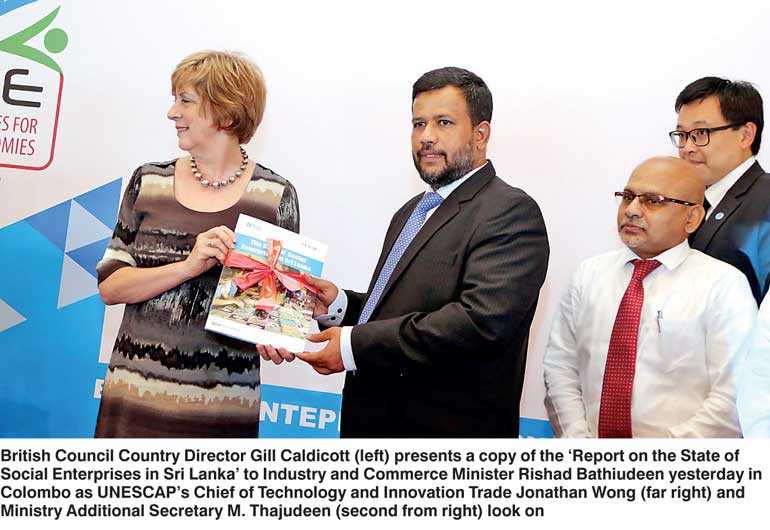Saturday Feb 07, 2026
Saturday Feb 07, 2026
Friday, 29 June 2018 00:10 - - {{hitsCtrl.values.hits}}

Less than a year after an international coalition of 17 countries and many leading global organisations announced their support in Christchurch, New Zealand to the ambitious promotion of Social Enterprise (SE) across Asia-Pacific, the Sri Lankan Government for the first time announced that it too would actively help the development of SE to become an economic growth driver.
“I pledge today that I and my ministry will extend our fullest support to the development of SEs in Sri Lanka and work to promote them,” announced Industry and Commerce Minister Rishad Bathiudeen yesterday in Colombo.
Minister Bathiudeen was addressing the launch of the Report on the State of Social Enterprises in Sri Lanka by the British Council, UNESCAP and Lanka Social Ventures.
SE is an emergent economic force across the world but is a relatively new term to Sri Lanka. It is the practice of employing businesses and leveraging market mechanisms to address social problems. SE enterprises are not SMEs nor cooperatives but are profit-making with a social mission at the same time. UNESCAP believes SEs are a means of accelerating the progress of the implementation of the Sustainable Development Goals (SDGs).
In December 2017 a coalition of officials from 17 countries (including Sri Lanka) and key private sector figures at the Social Enterprise World Forum meeting in Christchurch, New Zealand embraced SE.
“SEs are critical drivers of innovation for sustainable development that can play a catalytic role in advancing inclusive and sustained economic growth, shared prosperity and decent work for all,” the historic SE coalition announced.
“Social enterprises are becoming prominent in Sri Lanka but consumers do not know them as SEs. Many well-known Lankan social enterprises such as the Good Market, Selyn Fairtrade handlooms, Sustainability Edge, Emerge Lanka Foundation and the Lak Aruna Foundation have gained mini-brand status among local consumers but consumers still do not know them as SEs,” said Minister Bathiudeen “Instead many people tend to view them as another set of SMEs or NGOs. For example, the Chitra Lane Welfare Society has been operating for more than 40 years but many people believe it to be another charity welfare rather than an SE that provides special education and other services to children with special needs. I believe that popularising these brands as successful social enterprises in Sri Lanka would create awareness about the practical use of them in Sri Lanka. The report also says that there is a need for policy attention. The SME policy by my ministry already refers to SEs. As the National Enterprise Development Authority (NEDA), which focuses on entrepreneur development and SMEs, and the cooperatives are under my ministry, I am familiar with the many problems faced by our SME sector and our experience can help grow SEs. I wish to thank and commend the British Council and UNESCAP for including Sri Lanka in this global research project, which was conducted in countries such as Bangladesh, Kenya and the Philippines,” he added.
Lankan SEs, despite being in existence for decades, started growing only in the last five years. The report presented yesterday identified 11,000 SEs currently in operation across multiple sectors in Sri Lanka. There is a high involvement of youth and women in local SEs and most of them are in the Western and Central provinces. Almost half of Lankan SEs report a turnover of less than Rs. 1 million.
The SME policy introduced by NEDA under the Ministry of Industry and Commerce last year supports “social entrepreneurship, ethical production and fair trade branding by creating awareness of the concepts, requirements and opportunities in local and international markets.”